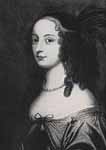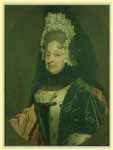Sophie (Sophia)
(1630-1714)
Duchess of Brunswick - Lüneburg - Calenberg (Hanover) (from 1679)
Electress of Brunswick - Lüneburg - Calenberg (Hanover) (from 1692)
Electress-Dowager of Brunswick - Lüneburg - Calenberg (Hanover) (from 1698)
 |
The portrait at left shows Sophie as the young Princess Palatine. The portrait at right shows Electress-Dowager Sophie as a widow, with a widow's veil and ermine robe. |
 |
Sophie was the twelfth child of Friedrich V. (1596-1632), elector Palatine (from 1610) and the "Winter King" of Bohemia (1619-1620), by his consort Elizabeth Stuart (1596-1662), a daughter to the English king James I. (1566-1625) and known as "The Queen of Hearts" owing to her great grace and beauty. On 14 October 1630, Sophie was born at The Hague, where her parents, deposed from power, had taken refuge. Sophie had three older sisters, one of whom, Elizabeth (1618-1680), became a friend and philosophical correspondent of the philosopher René Descartes (1596-1650), just as Sophie herself would become the friend and philosophical correspondent of the philosopher Gottfried Wilhelm Leibniz (1646-1716). After a one-year war, their father had lost the Bohemian kingdom to which he had been called in 1619 by those rebelling against its Catholic Habsburg ruler. The Habsburgs predicted that Friedrich would be a winter king, gone with the melting snow, and when the prediction was proved true after Friedrich's defeat at the battle of the White Mountain, he was forever burdened with the epithet "Winter King."
After 1649 Sophie resided at Heidelberg with her brother, the restored elector Palatine, Karl Ludwig. She was betrothed to Georg Wilhelm (1624-1705), duke of Lüneburg - Calenberg (Hanover) from 1648-1665 and Duke of Lüneburg - Celle from 1665-1705. But in 1658 she married Georg Wilhelm's brother, Ernst August (1629-1698), prince-bishop of Osnabrück from 1661, Duke of Lüneburg - Calenberg (Hanover) from 1679, and first elector of Brunswick - Lüneburg (Hanover) from 1692-1698.
Although the first few years of her marriage to Ernst August were generally happy ones, the later years were troubled. Once he had achieved an independent status as prince-bishop of Osnabrück in 1661, Ernst August engaged in frequent affairs outside his marriage. In the 1670s Ernst August became seriously involved with Klara Elisabeth von Meysenbug, who in 1673 married Franz Ernst Baron von Platen, the governor of Ernst August's legitimate sons. A daughter born to Klara in 1675, Sophie Charlotte—not to be confused with the daughter born to Ernst August and Sophie in 1668, ironically also named Sophie Charlotte (1668-1705), who would eventually become queen of Prussia—was accepted into the family as Ernst August's daughter and treated as the half-sister of the legitimate children.
Sophie was the intellectual and cultural focus at the court in Hanover. Sometime after 1680, she completed the baroque garden park of Herrenhausen, which her brother-in-law, Johann Friedrich (1625-1679), had already begun in 1666. Sophie once said: "The great garden at Herrenhausen is the only thing with which we can show off." Sophie also became the good friend and confidant of Gottfried Wilhelm Leibniz, the court Librarian and Privy Counselor, who by then also had a world-wide reputation as philosopher, physicist, theologian, and mathematician. Leibniz had first been appointed to the court at Hanover in 1676 by Johann Friedrich, and he had been retained when Ernst August became Duke of Lüneburg - Calenberg (Hanover) upon the death of Johann Friedrich in December 1679. In 1696 Ernst August elevated Leibniz to the position of Privy Counselor of Justice, a judicial office ranking just below Vice-Chancellor. In a revealing remark made in a letter of to Thomas Burnet, Leibniz revealed the important role that Sophie played in his otherwise impoverished intellectual life in Hanover:
"All that bothers me is that I am not in a great city like Paris or London, which are full of learned men from whom one can benefit and even be helped. For there are many things that one cannot do by oneself. But here one finds scarcely anyone with whom to talk; or rather, in this region a courtier is not supposed to speak of learned matters, and without the Electress [Sophie] they would be spoken of even less." [G.III.175]
Through the Act of Settlement (1701), the English Parliament decided to amend the law of succession to the throne in favor of the Protestant House of Stuart. In default of heirs from William III. of Orange (1650-1702)—who had ruled alone in England after the death of his wife, queen Mary II. (1662-1694)—or Anne (1665-1714), Mary's sister, the Act declared that the English crown would settle upon "the most excellent princess Sophia, Electress and duchess-dowager of Hanover" and "the heirs of her body, being Protestant." But Sophie died in her beloved park at Herrenhausen on 8 June 1714, and it was her son, Georg Ludwig (1660-1727), Elector of Brunswick - Lüneburg (Hanover), who, upon the death of queen Anne on 12 August 1714, became the first Hanoverian to ascend the British throne. Following, among other sources, Johann Mathias von der Schulenburg's letter of 13 June 1714 to Leibniz, Aiton has summarized the events surrounding Sophie's death as follows:
"[Schulenburg] attributed [Sophie's] death to chagrin over an unfriendly letter she had received from Queen Anne (K 9, pp. 454-455). Owing to a misunderstanding, the Queen believed that Hanover wished to send the Electoral Prince [Georg August (1683-1760)] to London without advising her Court, and she made clear her objection to the presence of the Prince in London during her lifetime. On 9 June (not knowing that Sophie had died the day before), Leibniz sent a letter to von der Schulenburg (K 9, pp. 478-479) defending the action of the ambassador Ludwig Justus von Schütz in addressing his request concerning the [Electoral] Prince to the Chancellor rather than the Queen, for that was the recognized diplomatic procedure. Sophie was certainly upset by the Queen's letter (and similar letters to the Elector and the Electoral Prince), for two days before her death, she remarked to the Countess of Bückeburg that the affair would make her ill and that she would die of it. On the fatal Friday, Sophie dined in public and in the evening she walked in the park discussing the affairs of England with [Princess] Caroline (1683-1737) [of Brandenburg - Ansbach]. Turning to the Countess von Bückeburg, who was walking a few steps distance out of respect, she took her hand and walked between the Countess and the Princess, talking about all sorts of things, among them the beauty of Madame Bousch, who was walking with her sister at the other end of the avenue. When they were in the middle of the park and had traversed the avenue up to the first fountain, Sophie began to falter. Caroline asked if she was ill. She sighed and indicated her stomach. It started to rain heavily and the park emptied. With difficulty she tried to make the ten steps to the nearest shelter. Then she said, 'I am very ill; give me your hand.' A few moments later she was dead." [Aiton, pp. 318-319]
![]()
Sources
- The Encyclopedia Britannica, 13th edition. New York: The Encyclopedia Britannica, Inc., 1926.
- Aiton, E. J. Leibniz: A Biography. Boston: Adam Hilger, 1985.
- Hatton, Ragnhild Marie. George I: Elector and King. Cambridge, Mass.: Harvard University Press, 1978.
- Leibniz, G. W. Die philosophischen Schriften. Ed. C. I. Gerhardt. 7 vols. Berlin, 1857-1890. Reprinted Hildesheim, 1965. [Abbreviated as G]
- Leibniz. G. W. Die Werke von Leibniz, erste Reihe: Historisch-politische und staatswissenschaftliche Schriften. Ed. O. Klopp. 11 vols. Hanover, 1864-1884.
Web





